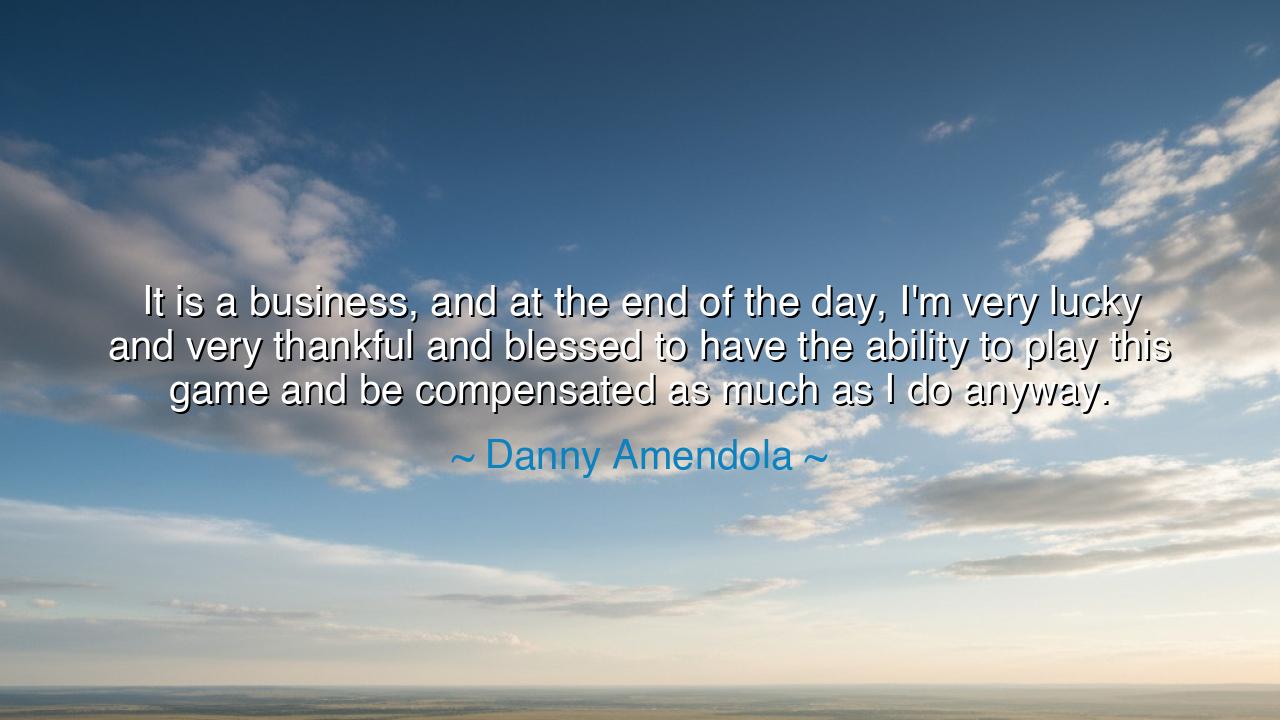
It is a business, and at the end of the day, I'm very lucky and
It is a business, and at the end of the day, I'm very lucky and very thankful and blessed to have the ability to play this game and be compensated as much as I do anyway.






Danny Amendola once said with humility and clarity: “It is a business, and at the end of the day, I’m very lucky and very thankful and blessed to have the ability to play this game and be compensated as much as I do anyway.” These words, though spoken in the arena of modern sport, are filled with the wisdom of the ancients. They remind us that even within the spectacle of competition, where fame and fortune dazzle the eyes, there must remain a spirit of humility, gratitude, and recognition that one’s gifts are never earned by strength alone, but bestowed by grace.
The ancients, too, saw this balance between the glory of the contest and the humility of the victor. In Olympia, when athletes received the crown of olive leaves, they bowed not only to the gods but to the people who sustained the games. They understood that the contest was not simply about personal triumph—it was a business, woven into the life of the city, supported by merchants, spectators, and patrons. Amendola’s words echo this timeless truth: the game is not isolated, but part of a larger structure of work, commerce, and sacrifice, and even the greatest must see themselves as one thread in the tapestry.
The heart of his reflection lies in the words lucky, thankful, and blessed. Many who rise to wealth and recognition deceive themselves into believing they did so by merit alone. Yet Amendola humbles himself, acknowledging the mystery of fortune—that he was granted health, talent, and opportunity when countless others, equally passionate, never received the same. This humility is what the ancients called eusebia, reverence toward the divine order, a recognition that destiny is not entirely in our control.
History gives us mirrors of this truth. Consider Marcus Aurelius, emperor of Rome, who though robed in supreme power, wrote in his Meditations that every gift—his mind, his station, his ability to lead—was granted by the gods, his teachers, and his people. He, too, confessed himself thankful and blessed, refusing to believe that greatness was his possession alone. Like Amendola, he saw the truth: that to be sustained, rewarded, and celebrated for one’s labors is a privilege, not a right.
There is also an important lesson in Amendola’s acknowledgment that football is a business. Too often, passion blinds us to reality. But wisdom lies in seeing clearly—that behind the spectacle of the game, there are contracts, wages, risks, and sacrifices. To call it a business is not to cheapen it, but to respect the reality that many hands are involved in creating the stage. Gratitude, then, extends not only to God for health and talent, but also to the managers, coaches, owners, and fans who make the enterprise possible.
The deeper meaning of this quote is that humility must anchor success. To recognize oneself as lucky and blessed prevents the poison of arrogance. To remain thankful ensures that wealth and fame do not corrupt the heart but are seen as tools for greater purpose. This attitude, more than raw skill, is what sustains both the athlete and the man. Without gratitude, success becomes a fleeting shadow; with it, success becomes a legacy.
The lesson is clear. In your own life, whatever stage you stand upon—whether in sport, art, work, or family—remember that your gifts are not yours alone. They are sustained by God, by fortune, by the community around you. Be thankful for them, and see even your labor as part of a larger order. Do not boast of what you have, but honor it with humility and with service.
Practical counsel may be given. Begin and end your days with gratitude, not only for what you earn but for the very ability to labor. Recognize the unseen hands that make your work possible, and give back when you can. Carry the spirit of thankfulness into every success, so that when you look back upon your journey, you may say as Amendola did: I was lucky, I was blessed, and I was always thankful. For this is the heart of wisdom, and the true victory of life.






AAdministratorAdministrator
Welcome, honored guests. Please leave a comment, we will respond soon